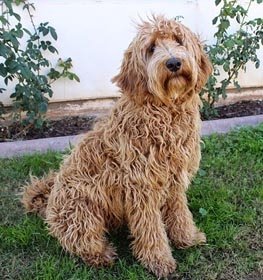Shorkie Information & Dog Breed Facts
Collection of all the general dog breed info about Shorkie so you can get to know the breed more.
| Group | Designer Dogs |
|---|---|
| Popularity Rank | 597 |
| Reviews | 1 |
| User Ratings | |
|
Compare the Shorkie With Other Dogs
Select at least one dog breed to make the comparsion. | |
 | |
| Origin | |
|
Common Names & Aliases
What other names is a Shorkie known by? Discover all traditional, regional and informal names used for this breed. | Shorkie TzuYorkie Tzu |
|---|---|
|
Breed Classification
What type of dog breed is a Shorkie? Learn about its genetic classification and breeding category. | Cross Breed |
|
Size Classification
What size category is a Shorkie? Learn how big the Shorkie breed typically grows. | Small |
|---|---|
|
Weight Statistics
How much does a Shorkie weigh? Discover typical weight ranges for adult males and females of the Shorkie breed. | 5-15 pounds (2.3-6.8 kg) |
|
Average Weight
What is the average weight of a Shorkie? | 10 pounds (4.5 kg) |
|
Height
How tall is the Shorkie? Shorkie height: | 6-14 inches (15-36 cm) |
|
Average Height
What is the average height of a Shorkie? | 10 inches (25.5 cm) |
|
Price Range
How much does a Shorkie puppy cost? Find current market prices and factors affecting Shorkie costs. | $800-$1000 If you choose to purchase the Shorkie, you should know that the mentioned amount of money is an average of the collected data from breeders’ sites and puppy finder places. If you have a Shorkie for sale, please advertise it on a reliable website to make sure the Shorkie gets to a happy place. |
|---|---|
|
Availability
How easy is it to get a Shorkie? How many Shorkie are there in the world? | Average: The Shorkie is a commonly available dog breed. There is less risk of overbreeding compared to the very popular dogs. Of course, they may be more popular in some countries, and inbreeding may occur, so be careful. |
|
Intelligence Rating
How intelligent is a Shorkie? Discover the Shorkie's intelligence ranking and learning capabilities. | Average: It takes patience to teach this breed any tricks or commands, but the effort is worth it. They understand and remember new commands after an average of 25-40 repetitions.
The Shorkie ranks average in the intelligence ranking of dogs. |
|---|---|
|
Training Difficulty
How easy is it to train a Shorkie? Learn about the Shorkie's trainability and response to training methods. | Shorkie dogs are quite easy to train. Sometimes they can be challenging, but if you're consistent in teaching new commands they will obey for sure. |
|
Watchdog Rating
How good is a Shorkie as a watchdog? Learn about the Shorkie's alertness and guarding instincts. | Shorkie dogs are average watchdogs. If they sense something different, they will alert you, but observation isn't considered their main job.
|
|
Territorial Protection
Is a Shorkie protective of its territory? Learn about the Shorkie's guarding instincts and behavior. | Shorkie dogs are average defenders. Some dogs are very protective of their territory, while others easily let a stranger to trespass. This breed is not sure to defend its territory in every situation. |
|
Personality Traits
What personality does a Shorkie have? Learn about characteristic Shorkie temperament and behavior traits. | StubbornEnergeticLoyal |
|---|---|
|
Sensitivity Level
How sensitive are they? Shorkie sensitivity: | Shorkie dogs have an average emotional level and are not the most sensitive dog breed. Sometimes it's okay to change the daily routine, have guests and listen to loud music.
Some dogs handle moderate punishment very well, while others crumble apart at a dirty look. This breed is not affected emotionally by moderate punishment. |
|
Affection Level
How affectionate are they? Is a Shorkie a good family dog? | Average to High: Shorkie dogs are highly affectionate dogs. They like being involved in the family's life. This breed isn't considered an aloof dog. |
|
Social Needs
How much social interaction does the Shorkie Tzu need? Shorkie social needs: | Shorkie dogs need a lot of social interaction. They desire to always be with someone or around people. This breed hates being left alone. |
|
Impulse to Wander or Roam
How likely is the Shorkie to run away? Does this breed explore or wander a lot? Does Shorkie roam? | Shorkie dogs have average wanderlust potential. Sometimes they like to explore the world and they might escape once or twice, but usually, they prefer staying safely at home. Safer to teach them how to get back to you on command. |
|
Prey Drive
Do this canine have a strong prey drive? Does Shorkie have high prey drive? | Shorkie dogs have a higher impulse to chase and catch something than other dog breeds. Cats or any other small animals might be in danger. It's a natural instinct, doesn't necessarily mean that Shorkie dogs are aggressive. Better to keep this breed on a leash. |
|
Barking Frequency
Does a Shorkie bark a lot? Learn about typical Shorkie vocalization patterns and triggers. | Average to High: The Shorkie is a vocal breed. Not the best choice if you prefer a quiet breed. They often bark loudly and howl sometimes. They can change their barks depending on their emotional level and what they're trying to say. Different barks could mean the same and the same barks could have different meanings.
Top reasons for barking: protection, alarm, fear, boredom, attention-seeking, greeting, separation anxiety, compulsive barking. |
|---|---|
|
Playful Nature
How playful is a Shorkie? Understand the typical play drive and energy level of the Shorkie breed. | The Shorkie is a highly playful breed. Excited barking and sometimes nipping will alert you to play. |
|
Apartment Adaptability
Can a Shorkie live in an apartment? Learn about the Shorkie's suitability for apartment living. | Very house-friendly dog the Shorkie breed. It's good if you have a small garden where he can go out and do his business, but it's not important at all. You can get enough exercise with one or two walks a day, so keeping them indoors shouldn't be a problem. |
|
Lifestyle Adaptability
How adaptable is a Shorkie to lifestyle changes? Learn about the Shorkie's flexibility to new situations. | Average: Shorkie dogs adapt to lifestyle changes and different living environments quite okay usually. |
|---|---|
|
Alone Time Tolerance
Can a Shorkie be left alone? Learn about the Shorkie's tolerance to solitude. | Shorkie dogs tend to have separation anxiety when their owners left them alone at home because they bond very closely with them. |
|
Bite Risk Assessment
What is a Shorkie biting potential? Learn about the Shorkie's bite risk factors. | Low 🔽 The Shorkie has a low chance of biting somebody. Top reasons for dog bite: protection, pain, excitement, herding instinct, being provoked. (Data based on the available online bite statistics.) |
|---|---|
|
Mouthing Tendency
Is a Shorkie mouthy? Learn about the Shorkie's tendency to use mouth during play. | Shorkie dogs have a lower than average tendency to nip, chew, playbite, or herd people. It's a common habit during puppyhood, not aggressive behavior. These "bites" don't hurt, but Shorkie dogs need to be taught a good attitude. |
|
Bite Strength Rating
How strong is a Shorkie bite? Learn about the Shorkie's bite force measured in PSI. | Between 100 and 200 PSI 🔽 Shorkie bite force: Weak. The Shorkie bite force is considered weak when compared to other dog breeds. The bite force Shorkie measurements usually fall below 200 PSI, making them one of the breeds with the weakest bite force. The bite force of a Shorkie may be weak, but it's important to remember that any dog's bite can still be dangerous if not managed properly. Despite the bite force of Shorkie being lower, it does not make them any less lovable or enjoyable as pets.
Shorkie bite wounds might not be as severe, but it is still essential to be cautious and prevent any biting incidents. They are usually not aggressive and very friendly towards children and other animals. To ensure a well-behaved dog, it's essential to learn how to train a Shorkie puppy not to bite from an early age. With proper training and socialization, a Shorkie can be a wonderful addition to any family, providing love and companionship for years to come. |
|
Average Lifespan
How long does a Shorkie live? Learn about the typical lifespan of the Shorkie breed. | 12-16 years The average lifespan of Shorkie: 14 years |
|---|---|
|
Climate Tolerance
How well does a Shorkie handle different weather? Learn about the Shorkie's climate adaptability. | Prefers average to warm weather conditions Different dogs have different preferences when it comes to weather conditions. However, in general, most dogs prefer average to warm weather conditions, as they typically find hot weather conditions to be uncomfortable and taxing. |
|
Health Concerns
What health issues are common in a Shorkie? Discover typical conditions affecting the Shorkie breed. | Shorkies tend to have more frequent health issues than other breeds. Regular vet check-ups are needed.
|
|
Vet Care Frequency
How often does a Shorkie need vet visits? Learn about the Shorkie's veterinary care requirements. | Frequent The Shorkie should have a complete physical check-up at least once (but preferably twice) per year. If your dog shows any symptoms, call your veterinarian. |
|
Health Problems
What genetic/health problems does the Shorkie breed have? What are the health issues and concerns of the Shorkie breed? Most common health risks of Shorkie: | Dental ProblemsGlaucomaLiver IssuesLens LuxationBrachycephalic SyndromeHypoglycemiaRespiratory ProblemsSpinal Disorders |
|
Energy Rating
How energetic is a Shorkie? Understand daily activity needs of the Shorkie breed. | Shorkie dogs have a higher energy level than other dog breeds. If you want a dog for snuggling on the couch, this breed isn't the perfect choice for you. |
|---|---|
|
Activity Requirement / Exercise Need
How much exercise does a Shorkie need? How much exercise do Shorkie dogs require per day?
Do Shorkie dogs need a lot of exercises? | Shorkie dogs exercise need is minimal. If you live a slow life, this breed can be a good choice for you. |
|
Sleeping Need
How much sleep does the Shorkie breed need? | Shorkie dogs are quite energetic dogs and they don't spend too much time with sleeping. If you live an active life, this breed can be a good choice for you. |
|
Obesity Tendency
Is a Shorkie prone to weight gain? Learn about the Shorkie's obesity risks. | Average: The Shorkie has an average risk for obesity. Daily walks should be on schedule. To make your dog happy and fit, feed him with quality dry dog food and live an active life together. Try to find the happy medium between exercise and feeding.
If you notice any weight gain, consult your veterinarian and make a diet plan. Reduce unhealthy food and snacks, and measure the Shorkie weight regularly. |
|---|---|
|
Food Consumption
How much food does a Shorkie need daily? Learn about the Shorkie's feeding requirements. | 1/2 to 1.5 cups of high-quality dry food a day, divided into two meals. |
|
Allergy Friendliness
Is a Shorkie hypoallergenic? Learn about the Shorkie's suitability for allergy sufferers. | No Shorkie dogs don't do well with allergy sufferers by causing allergic reactions. Some dog breeds are even considered to higher possibility of an allergic response. Coat type isn't necessarily relevant, because most people are allergic to dander (flakes on the dog's skin) or saliva, not actually to dog hair. |
|---|---|
|
Coat Colors
What colors does a Shorkie come in? Discover all possible Shorkie color variations. | Black Red Blue White BrownFawn |
|
Grooming Requirements
How much grooming does a Shorkie need? Learn about Shorkie coat maintenance requirements. | Easy to groom: The Shorkie doesn't require a lot of grooming. Seasonal flea treatment is needed, but cutting the dog's hair by a professional groomer isn't necessary. Ears and eyes should be cleaned regularly to avoid infections. Shorkie is a good choice if you don't have the time, skill, or money to take care of a high-maintenance dog. Recommended for beginners. |
|
Drooling Tendency
Does a Shorkie drool a lot? Learn about the Shorkie's drooling habits. | The Shorkie is a perfect example of a very low drooling tendency. If you're disgusted by slobber spots on your clothes, the Shorkie could be a perfect choice for you. Drooling is the unintentional saliva flowing outside of the mouth. It can be completely normal or a sign of a health problem. Certain dog breeds drool minimum compared to others, just like the Shorkie.
If you notice any change in your dog's drooling habit, you should contact a vet as soon as possible. |
|
Stinkiness Rating
Does a Shorkie smell bad? Learn about the Shorkie's natural odor levels. | Low 🔽 The Shorkie has a low chance of bad smell. Top reasons for dog stinkiness: infection of bad tooth/ear/skin folds, gas attacks. |
|
Coat Characteristics
What type of coat does a Shorkie have? Learn about the Shorkie's fur characteristics. | StraightMedium |
|
Bathing Needs
How often does a Shorkie need baths? Learn about the Shorkie's bathing requirements. | 4-6 weeks Average. Experts recommended at least every 4-6 weeks for this family pup. According to a study, 56% of pet parents don’t bathe their dogs as frequently as they should, and 60% use the sniff test when deciding when it’s bath time.
Bathing your dog is beneficial to them in more ways than just one. It’s also a good time to look for unusual scratches, bumps, fleas, and other irregularities. When their hair is wet and flat against their body, these details are more visible. |
|
Shedding Level
How much do Shorkie dogs shed? How to control, reduce and prevent the shedding of the Shorkie Tzu? Do Shorkie dogs shed a lot? | Shorkie dogs are low shedders. It's a natural process of the hair growth cycle. The amount and frequency of hair loss mostly depend on their health status and breed type. |
|
Child Compatibility
Is a Shorkie good with children? Learn about the Shorkie's behavior around kids of different ages. | Shorkie dogs are average friendly dogs towards children. |
|---|---|
|
Pet Compatibility
How well does a Shorkie get along with other pets? Discover the Shorkie's compatibility with other animals. | Shorkie dogs do best when they’re the only pet at the family. |
|
Stranger Friendly
Are they aggressive or friendly towards/with strangers? Shorkie temperament with other people: | Shorkie dogs are average friendly towards strangers. |
|
Cat Friendly
How well do Shorkie dogs get along with cats? Are they good with kittens? What is this fido's temperament with cats? Can they be good with cats? Can the Shorkie breed live with a cat? | Shorkie dogs are not cat-friendly dogs. |
|
Dog Friendly
Is Shorkie good with other dogs? Are they dog-friendly dogs? How well do Shorkie dogs get along with other dogs? | Shorkie dogs are average friendly towards other dogs. |
|
Good For First Time Owners
Is Shorkie breed good for first-time owners? Do they make a good dog for novice owners? Is Shorkie breed suitable for first-time owners? | Yes Shorkie dogs are good for novice owners, due to their easy-going personality. |
|
Office Friendly
Are Shorkie dogs good office canines? Do Shorkie dogs make good office-friendly pets? Can they be office dogs? | Yes Shorkie is one of the best dog breeds for office environment |
|
Senior Citizens Friendly
Are they senior citizens friendly dogs? How well do Shorkie dogs get along with the elderly people? What is the Shorkie Tzu temperament with senior people? Are Shorkie dogs good for elderly owners? | Shorkies are commonly okay with elderly people. |
|
Service Dog Capability
Can a Shorkie be a service dog? Learn about the Shorkie's service work potential. | Not really This breed generally not used as a service dog. A service dog is a term used in the USA to refer to any type of assistance dog specifically trained to help people who have disabilities, such as visual impairment, hearing impairments, mental disorders, seizures, mobility impairment, and diabetes. Service dogs are protected under the ADA (Americans with Disabilities Act).
Shorkie is not the best breed for service purposes. |
|---|---|
|
Therapy Work Suitability
Is a Shorkie good as a therapy dog? Learn about the Shorkie's therapy work aptitude. | Not really This breed is generally not used as a therapy dog. A therapy dog is a dog that might be trained to provide affection, comfort, and love to people in hospitals, retirement homes, nursing homes, schools, hospices, disaster areas, and people with anxiety disorders or autism.
Shorkie is not the best breed for therapeutic purposes. |
|
Scent Detection Ability
Is a Shorkie good at detection work? Learn about the Shorkie's scenting abilities. | Not really They are not typically employed for this type of work, but there may be exceptional cases. A detection dog or sniffer dog is a dog that is trained to use its senses (mostly its smell) to detect substances such as explosives, illegal drugs, wildlife scat, currency, blood, and contraband electronics such as illicit mobile phones.
Shorkie is not the best breed for detection purposes. |
|
Search & Rescue Potential
Can a Shorkie do search and rescue? Learn about the Shorkie's SAR capabilities. | Not really This dog breed is not typically used as a search and rescue dog. The use of dogs in search and rescue (SAR) is a valuable component in wilderness tracking, natural disasters, mass casualty events, and locating missing people.
The Shorkie is not the best breed for SAR purposes. |
|
Maritime Work Ability
Is a Shorkie good on boats? Learn about the Shorkie's maritime capabilities. | Not really Shorkie breed usually doesn't like being on a boat. Boat dogs were typically bred for their strength, stamina, and water resistance, as they were often required to perform tasks such as pulling in fishing nets, and jumping into the water to retrieve ropes or lines, or helping to move cargo. Sailor dog is a type of dog that was bred to accompany sailors on their voyages. They were typically used for three purposes: as a working dog, a watchdog, and as a companion. A boat dog is a term used to describe a type of dog that was traditionally bred and used as a working dog on boats. |
|
Draft Work Capability
Can a Shorkie pull carts? Learn about the Shorkie's drafting abilities. | Not really A drafting dog or draft dog is a dog bred and used for cart pulling. Dogs bred for this work have strong builds and qualities that are needed, strength and determination.
Shorkie is not the best breed for drafting purposes. |
|
Military Service Background
Was a Shorkie used in military service? Learn about the Shorkie's military history. | Not really In history, this breed was not really used for combat dog. |
|
Puppy Litter Size
How many puppies does a Shorkie usually have? Learn about typical litter sizes. | 3-5 puppies |
|---|---|
|
Pregnancy Duration
How long is a Shorkie pregnant? Learn about the Shorkie's gestation period. | 60-64 days Reproductive cycle of the female Shorkie: The first period called Proestrus lasts for about 9 days.
During this time the females start to attract males. You can notice by swelling vulva and bloody discharge. The second part is the Estrus when the female is receptive for the male. It lasts for about 3 to 11 days. The sign of the proestrus part is the soft and enlarged vulva. The discharge decreases and lightens in color. The third part is the Diestrus. Normally, it occurs around day 14. In this period the female’s discharge changes for vivid red and coming to its end. The vulva returns to average, and she will no longer permit mating. The fourth part called the Anestrus. The time frame between heat periods normally lasts about six months. |
|
Breeding Frequency
How often can a Shorkie have puppies? Learn about safe breeding intervals. | Once a year. More frequent breeding is not healthy. It is very important not to buy a dog from a puppy mill, where the needs of the pups and their mothers are ignored. It's an inhumane high-volume dog breeding facility, where puppies born several times a year. |
|
AKC Classification
What AKC group is a Shorkie in? Learn about the Shorkie's AKC classification. | Not recognized by the American Kennel Club. |
|---|---|
|
FCI Classification
What FCI group is a Shorkie in? Learn about the Shorkie's international classification. | Not recognized by FCI. |
|
Kennel Club Recognition
Which kennel clubs recognize a Shorkie? Learn about the Shorkie's official recognition. | American Canine Hybrid ClubInternational Designer Canine Registry |
Shorkie Pros and Cons
- Apartment Adaptability: Very house-friendly dog the Shorkie breed.
- Grooming Requirements: Easy to groom: The Shorkie doesn't require a lot of grooming.
- Shedding Level: Shorkie dogs are low shedders.
- Drooling Tendency: The Shorkie is a perfect example of a very low drooling tendency.
- Stinkiness Rating: The Shorkie has a low chance of bad smell.
- Mouthing Tendency: Shorkie dogs have a lower than average tendency to nip, chew, playbite, or herd people.
- Office Friendly: Shorkie is one of the best dog breeds for office environment
- Good For First Time Owners: Shorkie dogs are good for novice owners, due to their easy-going personality.
- Health Concerns: Shorkies tend to have more frequent health issues than other breeds.
- Allergy Friendliness: Shorkie dogs don't do well with allergy sufferers by causing allergic reactions.
- Alone Time Tolerance: Shorkie dogs tend to have separation anxiety when their owners left them alone at home because they bond very closely with them.
- Cat Friendly: Shorkie dogs are not cat-friendly dogs.
Shorkie History
Shorkie is not a purebred, it is a designed hybrid which was created in the 90s in the United States along most of the other designer breeds but now it appears to be in Britain and Ireland where it is most in demand. The mix was created by crossing Shih Tzu and Yorkshire Terrier and also known as Shorkie Tzu or Yorkie Tzu. Both parent breeds are a devoted small companion pedigree, they are both friendly with an attractive appearance which is suitable for living indoors. Neither parent breed sheds heavily so that’s not a surprise that this is true for the Shorkie itself as well.
Although their history doesn’t date back for so long, since they just started to be purposely bred in the last two decades both parent breeds have an interesting and rich history. Shih Tzu is one of the oldest breeds in the world, originated in Tibet. This dog was deemed to be of royalty and lived in breath-taking temples. Presumably, the ancestor of the dog we know today had been given to an emperor of China around the era of the Qing Dynasty between 1644 and 1662. As time went by, China became known as the creators of this breed, more so than the original Tibet. Shih Tzu was often referred to as the Lion Dog as the Lion symbol played a large role in Buddhism, which is as we know the determining religion of the area since ancient times. As lions actually were not indigenous in the region but had traditional symbolic importance the Chinese tended to breed their dogs to look as similar to lions as possible. A Chinese empress Cixi was the one who worked hard and carefully on breeding to get the result of the dog we know today. However, after the Communist Revolution, her large breeding facilities were destroyed, along with most of the dogs. Only a few Shih Tzus were saved and imported into England, where the breed was perfected in the early 20th century. The AKC recognized the Shih Tzu in 1969 as an official breed in the Toy dog class and currently is among the top 20 most popular toy breed dogs in the world.
The Yorkshire Terriers' origin is only dating back to the previous century. This breed was originally created for the purpose of catching rats in mines and households and were also used for hunting to borrow underground after badgers and foxes. The breed was named after the region of England in which they originated; Yorkshire. Several small Terrier breeds were combined to create the Yorkie breed. One of the ancestors of the Yorkshire Terrier among others is the Waterside Terrier, which is a small Scottish breed with a long blue-gray coat. The Waterside Terrier was brought to Yorkshire, in the mid 19th century by the miners and workers from Scotland, who migrated to England during the Industrial Revolution. The Yorkie made its first official appearance in England in 1861 during a bench show. At this time they were known as the “Broken-haired Scotch Terrier”. The Yorkie kept this title for 9 years until during one show a reporter commented that the breed should be known as Yorkshire Terriers because the breed had improved so much since their arrival in Yorkshire. The Yorkshire Terrier is also a fully acknowledged and recognized breed by the AKC and other noted international Kennel Clubs.
However, Shorkies are not recognized by the American Kennel Club, since they are a designed mix breed they are recognized by the American Canine Hybrid Club and the International Designer Canine Registry.
Latest Shorkie Compares
Shorkie Names
How old is my Shorkie in human years?
You May Also Like
Rate The Shorkie Breed
Shorkie Comments, Reviews and Questions
- Shorkie Tzu
Nov 14, 2020, 1:35:11 AM:
Excellent




